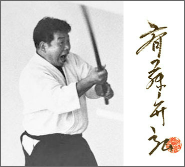 When did you start aikido and why?
When did you start aikido and why?
I have always been active and interested in a variety of sports and movement activities. I was teaching at the University of Surrey in 2003-4 and was invited to attend an aiki-jujitsu class on campus. While not a traditional aikido style the fundamentals and principles of aikido were taught. I found the practice and philosophy of aikido resonated with my experience and practice as a Chiropractor and saw aikido as not merely a physical practice but a mind-body approach to health and personal growth. After approximately 5 years in 2009 I decided to pursue a more traditional approach to aikido and joined the Reading club with Sensei Garmston to study Iwama -style aikido.
What are some of your main memories of aikido?
I remember mostly the enjoyment I experience in training, learning and striving with others to improve. Some moments include the grace of Sensei Sergeants’ big man aikido, the smoothness and effectiveness of Sensei Garmstons’ fundamentals and rising early to walk down to the beach in Kefalonia, Greece to practice weapons. I have regularly participated in extended Uchi deshi or live in training most notably in Greece, Spain and Japan which were all interesting and memorable. One particular experience occurred when I visited the Hombu dojo in Japan and was wandering around looking for the practice area when the Doshu popped out of nowhere and asked me if he could help. I just about had a heart attack.
What are your personal goals in aikido?
I hope to continue to train and develop through the practice of aikido. As a mature aikidoka (63) it requires a change in focus from external power to improved utilisation of the principles of aikido; being centred, grounding, connection, blending and developing whole body/internal power.
Why do you think Iwama aikido is so unique?
I think Iwama-style aikido provides the closest link to the principles and practice of the founder of aikido; M. Ueshiba. Saito Sensei spent the most time with Ueshiba and distilled the practice of aikido into a learning system that incorporated both weapons work and tai jitsu. It provides the foundation from which all other styles have evolved. Our organisation has direct links and experience to this method through Sensei Sergeant.
What can aikido offer people in your opinion?
The journey of learning as an aikidoka is a process that requires patience, perseverance and humility. It facilitates the development of all of these attributes. The practice of aikido by reconnecting your body, mind and spirit helps facilitate body awareness, movement quality and well-being. This re-connection with yourself and others allows you to develop you ability to deal with fear and uncertainty which can be applicable to both your interpersonal relationships and interactions with the world.
Personally I have always been able to learn psychomotor skills relatively quickly but found aikido difficult and frustrating at times because it is not easy to learn. Just when you think you have ‘mastered’ something you quickly realise how far away from mastery you really are. When you finally experience improvement you appreciate it all the more. I think that is one of the things that appeals to me. I find training enjoyable and fun despite the inevitable frustrations.
How long have you been training?
16 years in total and just starting to get the hang of it.
Where have you travelled?
I have travelled extensively to train and have learned from many excellent teachers as well as fellow Aikidoka. I have travelled throughout the UK to train as well as Japan, Greece, Spain and Denmark.


